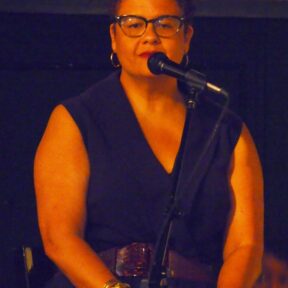
Elizabeth Alexander
: Photo from Wikimedia Commons / Author of Photo: Slowking4Overview
* Poet, essayist, playwright
* Professor of African American Studies and English
* Recited a poem at Barack Obama’s January 20, 2009 presidential inauguration
Elizabeth Alexander was born in Harlem, New York on May 30, 1962, and was raised in Washington, D.C. Her mother, Adele Logan Alexander, is a professor of African American Women’s History at George Washington University. Her father, Clifford Alexander, served as a civil-rights adviser to President Lyndon Johnson and was Secretary of the Army under President Jimmy Carter. And her brother Mark, a professor at Seton Hall Law School, worked for such high-profile Democrats as Bill Bradley, Ted Kennedy, and Howard Metzenbaum before becoming an adviser for Barack Obama‘s presidential transition team in 2008.
Elizabeth Alexander earned a bachelor’s degree from Yale University in 1984, a master’s degree from Boston University in 1987, and a Ph.D. in English from the University of Pennsylvania in 1992. While attending graduate school in 1984-85, she worked as a reporter for the Washington Post. And while she pursued her doctorate in 1990-91, she taught some classes at Haverford College. After completing her formal education, Alexander went on to become a poet, essayist, and playwright. To view a list of her major published works, click here.
In 1996 Alexander was a founding faculty member of the Cave Canem workshop, whose purpose was to develop new African-American poets. In 1997 she taught some undergraduate courses at the University of Chicago. And later that year, she moved to Massachusetts to teach at Smith College, where she became the Grace Hazard Conkling Poet-in-Residence and the first director of the school’s Poetry Center.
In 2000, Alexander took a job teaching African-American Studies and English at Yale University, a post she would hold for the next 15 years (including eight years as a department chairwoman. In 2005 she was an Alphonse Fletcher Foundation fellow, and in 2007-08 she became an Academic Fellow at Harvard’s Radcliffe Institute for Advanced Study.
Themes of gender, race, and class figure prominently in Alexander’s writing. She once told the New York Times that her poetry “attends to history,” including what is “sometimes thorny and difficult American history.” On another occasion, Alexander told the public radio program Cambridge Forum that she views poetry as a means by which she can help African Americans “envision what we are not meant to envision,” such as “real and enactable black power.” Her body of work, she expanded, reflects her choice to “meditate” on “a new-fashioned race pride.”
The title poem in Alexander’s first, celebrated book, The Venus Hottentot (1990), focuses on Saartjie Baartman, an early-nineteenth-century African slave who was put on display before a crowd of prospective buyers in Europe. The poem concludes with the slave’s violent fantasy response to a white onlooker:
“If he were to let me rise up
from this table, I’d spirit
his knives and cut out his black heart,
seal it with science fluid inside
a bell jar, place it on a low
shelf in a white man’s museum
so the whole world could see
it was shriveled and hard,
geometric, deformed, unnatural.”
Another of Alexander’s poems describes white passengers, aboard a disabled airborne jet, who have no faith in the black female pilot’s ability to steer the plane to safety:
“All the white passengers bailed out
before impact, so certain a sister
couldn’t navigate the crash. O gender.
O race. O ye of little faith.”
Viewing white bigotry as a still-pervasive societal defect of contemporary America, Alexander insisted in her 2004 prose anthology, The Black Interior, that “black thought and life rarely go uninterrupted by the violent gougings of racism.”
Citing “the complex fiction” of race and the African-American struggle for racial self-identification, Alexander likens the enjoyment that white people today derive from watching black athletes perform, to the enjoyment that whites in centuries past allegedly derived from watching public lynchings of blacks: “Black bodies in pain for public consumption have been an American national spectacle for centuries.”
In December 2008, president-elect Barack Obama announced that he had selected Alexander, with whom he had been friends since the two were colleagues at the University of Chicago in the 1990s, to recite a poem at his January 20, 2009 presidential inauguration. Titled “Praise Song for the Day,” Alexander’s poem made reference to the slaves who had worked so hard to help build America’s infrastructure in a bygone era. It also noted that there was “no need to pre-empt grievance” that blacks might feel as a result of past injustices.
In 2015, Alexander left Yale and took a position in Columbia University‘s Department of English and Comparative Literature. That same year, she was elected Chancellor of the Academy of American Poets and was named Director of Creativity and Free Expression at the Ford Foundation. In this post, says Ford, Alexander “shapes and directs Ford’s grant making in arts, media, and culture,” and “guides the foundation’s efforts to examine how cultural narratives affect and shape social movements and how media and the arts, including film and visual storytelling, can contribute to a fairer and more just society.”
Additional Resources:
Further Reading: “Elizabeth Alexander” (Poets.org, PoetryFoundation.org); “Poet Elizabeth Alexander’s Memoir of Love, Loss, Art and Glorious Food” (Washington Post, 4-29-2015); “Radcliffe Fellow, Poet Elizabeth Alexander Reads” (Harvard Gazette, 5-8-2008); “The Unpoet” (Ben Johnson, FrontPageMag.com, 1-20-2009); “Inaugural Poem” (NY Times, 1-20-2009).